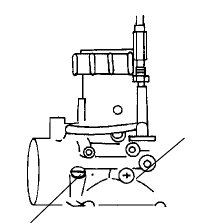
109
MAINTENANCE AND LUBRICATION
Adjustments
Carburetor
IMPORTANT: Your Polaris ATV is calibrated at the factory for
optimal performance at altitudes ranging from zero to 6,000 feet (1800
m) and temperatures of +40 degrees F. (4 degrees C.) or higher. Above
6000 feet (1800 m) the engine air/fuel mixture becomes overly rich and
the engine loses approximately 3% of its power for each 1000-foot
(304.8 m) increase in elevation. Although this power cannot be
regained, adjustments to the carburetor and drive system can be made
to allow more efficient operation. Optional jets, available from your
Polaris dealer, are required for operation above 6,000 feet and
temperatures below +40 degrees F. (4 degrees C.)
NOTE: Continuous operation of the engine without proper jetting
when required can cause poor performance, overheating or engine
damage. See your Polaris dealer for more information about jetting the
ATV for conditions in your area.
2-Cycle Engines
If the engine idle speed is not satisfactory, and all other conditions are
favorable, the carburetor can be adjusted.
1. Warm up the engine by running the
vehicle for approximately five
minutes.
2. Place the t ransmission in gear with the
parking brake applied.
3. Adjust the carburetor idle screw (1)
either in or out until the desired idle
RPM is reached. Turning the screw
in (clockwise) will raise RPM.
Turning the screw out
(counterclockwise) will lower
RPM.
The following variations apply to air screw (2) adjustment for 2-cycle
engines:
S For improving cold weather start and reducing audible detonation
noise, the air screw can be closed from 1/2 to 1 turn by turning the
screw clockwise.
S During hot weather and/or high altitude operation the air screw can
be adjusted for smoother operation by turning the screw counter-
clockwise for approximately 2 turns.
1
2
